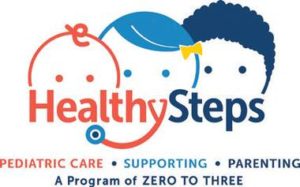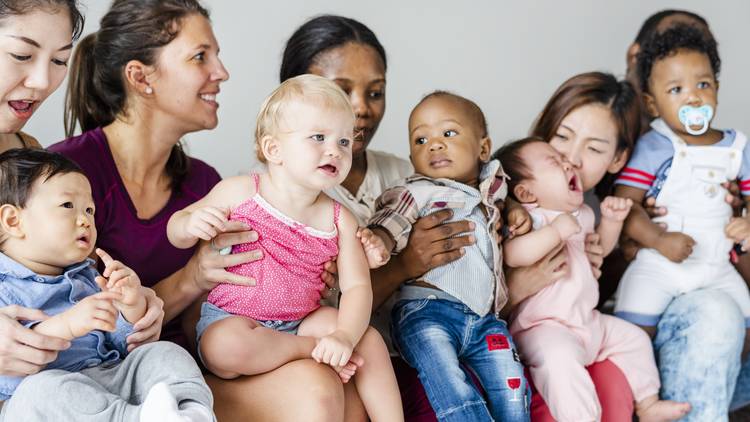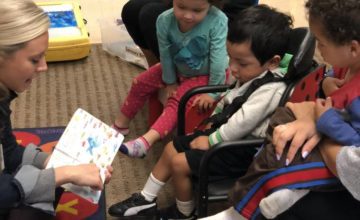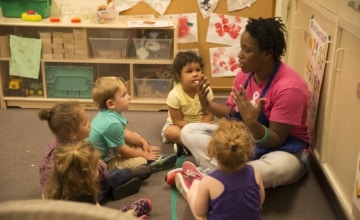A Community Framework for Early Childhood Collaboration Developed by the Model Convening Project
In communities across the country, families are striving to give their children a good start in life. They share a common desire for their babies to be healthy, happy, and secure, but also face considerable obstacles in raising their children, including health concerns, safety issues, and racial and economic inequities.
The front line for supporting families is people in communities. Yet, many well-intentioned programs and supports operate independently and don’t make the critical connections families need to address their complex challenges. This reality has created new urgency toward pursuing a bold, shared vision – a nation where all babies are born into communities of opportunity that provide them with what they need, where they need it, and when they need it.
That is why the leaders of four national early childhood models came together to develop Hand in Hand, a silo-busting, trust-building framework for community collaboration that achieves positive, equitable outcomes for all young children and their families.
About the Framework
The Hand in Hand framework reflects, incorporates, and builds upon lessons learned and insights from families, local partner affiliates, service providers, other community stakeholders, research, and practice innovations. The framework is organized around three essential elements of early childhood collaboration:

- Foundation
The values, processes, leadership, and resources that nurture collaboration in a community over time - Relationships
The social fabric that engages and sustains people in their shared efforts - Actions
The tangible steps people take together to support young children and families
Using the Framework
We encourage use of the Hand in Hand framework at every level of program implementation to deepen trust, engagement, and synergy between and among all partners in your community working to support young children and families. This is a practical and effective approach to collaboration that can be adapted to fit all communities.
Guide
A framework introduction, guiding principles, key elements, applications of the framework in communities, and questions to consider when using the framework
Briefs
Exploring alignment of early childhood services, policy and advocacy, and racial equity
- Aligning Early Childhood Services in Communities
- Advancing Racial Equity in Early Childhood Systems
- Public Policy Advocacy for Early Childhood
Story Bank
Detailed accounts from communities on implementing various aspects of the framework, including families’ perspectives on early childhood collaboration
Public Policy Advocacy in the District of Columbia

The Early Childhood Innovation Network in Washington, D.C., shares how they are leading a citywide movement to promote healthy families and children through focused interventions such as ZERO TO THREE’s HealthySteps program.
Meeting Parents Where They Are

Denise Brown recounts her experience with an unexpected pregnancy after being told she would not have children, and how Nurse-Family Partnership supported her and her family to work through the ups and downs of parenthood.
Addressing Racism as a Public Health Crisis

Psychologist Dominique Charlot-Swilley sees systemic racism firsthand in her work with families of color in Washington, D.C. Learn why she sees integrating behavioral health into pediatric primary care as a racial equity strategy.
Paying It Forward

Fatimah Jeffery was earning a bachelor’s degree while working full-time when to her amazement, she discovered she was pregnant, at age 40. Learn how she worked with Nurse-Family Partnership to become a parent leader.
Creating a Centralized Access Point on Long Island, New York

Learn how the four Model Convening Partners work together in Long Island to make sure all young children and families can access the services and resources they want and need in their community.
Community Alignment in Guilford County, North Carolina

Stormi Covington loves serving families with young children in North Carolina. Learn how she fights for better early childhood outcomes in Guilford County with the Get Ready Guilford Initiative.
Parent Leadership in Early Childhood Systems

Explore lessons learned from three communities about strategies for supporting parent leadership, from ZERO TO THREE and The National Collaborative for Infants & Toddlers.
Building Relationships in Service to Families

For the past 30 years, Phyllis D’Agostino’s work to support families has led her to seek connections like a detective hunting for clues. Learn how she has developed an expertise in community engagement and collaboration.
Striving for Racial Equity in Tarrant County, Texas

The Early Learning Alliance supports organizations working to help children in Tarrant County achieve success in school and life. See how its work is guided by the aim to eliminate disparities that undermine child well-being.
Directory of Publications Resources
Model Convening Project Partners
The Hand in Hand framework was developed by the Model Convening Project, a partnership of four complementary, evidence-based models. The Model Convening project is a multi-year initiative, with leadership and facilitation from ZERO TO THREE and funding from the Pritzker Children’s Initiative.
Family Connects
Population-based health program that enhances the local network of care by providing nurse home visits to all parents of newborns during the first month of life. During the visit, the nurse provides information, conducts health assessments, and makes connections to community resources that are needed.
HealthySteps
Program of ZERO TO THREE that integrates a child development expert into the pediatric primary care team to promote nurturing parenting and healthy development for babies and toddlers, particularly in areas where there have been persistent inequities for families with low incomes and families of color.
Help Me Grow
Supports communities in strengthening their early childhood systems through centralized access points, family and community outreach, child health care provider outreach, and data collection and analysis.
Nurse-Family Partnership
Provides nurse home visits to first-time moms and children living in poverty or with other risk factors. Services are provided prenatally to the child’s second birthday.






